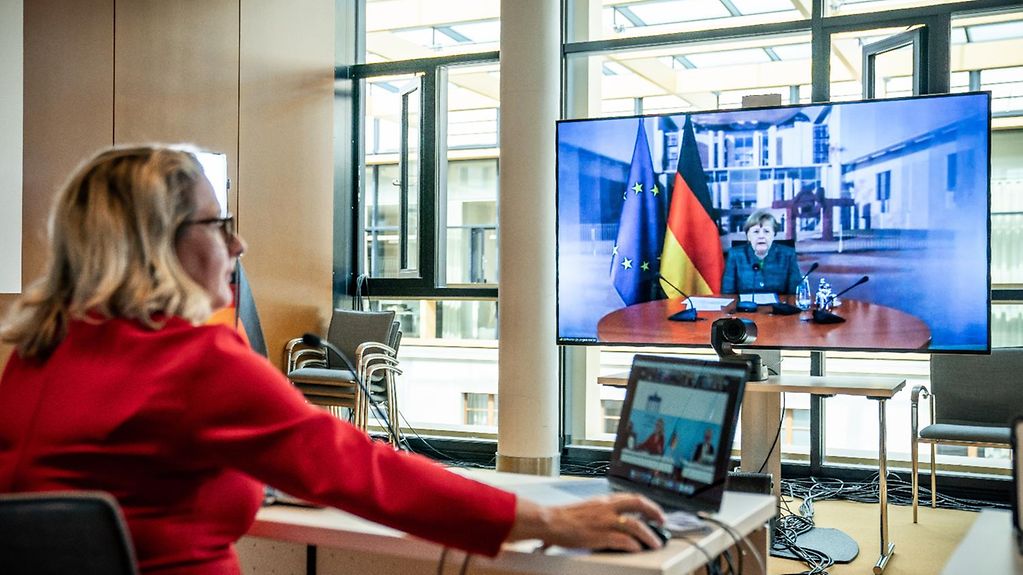International climate action
At the 11th Petersberg Climate Dialogue, Chancellor Angela Merkel has advocated that economic recovery programmes should take account of the imperatives of climate change mitigation. She stressed our international responsibility for implementing the Paris Agreement and welcomed the new, more ambitious EU climate targets for 2030.

Chancellor Angela Merkel also attended the "online" Petersberg Climate Dialogue; in the foreground sits host and Federal Environment Minister Svenja Schulze.
Photo: picture alliance/dpa
How can we ensure that the new start after the crisis is environmentally sound? In view of the COVID-19 pandemic, this question was central to the Petersberg Climate Dialogue, organised for the first time this year as a video conference. The highlight of the two-day dialogue was the high-ranking segment with UN Secretary-General António Guterres and Chancellor Angela Merkel.
In conjunction with possible assistance to revitalise the economy in the wake of the coronavirus crisis, the Chancellor said it was important not to economise on climate action but rather to invest in the technologies of the future. When countries now discuss recovery programmes for their struggling economies, it will be important to ensure we always keep climate imperatives uppermost in our minds, said Angela Merkel. We must look at the economy and the environment together.
Work must continue on realising the Paris Agreement
The Chancellor told conference participants, "We still have a responsibility to implement the Paris Agreement and it is still up to us to improve national contributions by 2030." With its Green Deal, the European Union is on the right path. By 2050 Europe is to become the first climate-neutral continent. As an interim step along the way, the Chancellor welcomed the European Commission’s target of reducing greenhouse gas emissions in the European Union by 50-55 per cent of the 1990 levels by 2030. The target to date had been 40 per cent.
Appropriate CO2 pricing needed
This will require us to invest in a climate-friendly infrastructure and will entail appropriate CO2 pricing. This is the most efficient market instrument for reducing emissions. "It would be most desirable if as many countries as possible in the world were to embrace this," said Angela Merkel. As of next year Germany is to introduce CO2 pricing in the traffic and heating sectors. This should increase incentives for businesses and private households to invest in climate-friendly alternatives in order to cut CO2 costs and emissions.
A move away from fossil fuels
The Chancellor also stressed that it is important for all parts of the international community to do their bit if global climate action is to succeed – by moving away from fossil fuels to embrace renewables and ensure greater energy efficiency. Germany will be pushing ahead to expand the use of renewables. By 2030 they should account for 65 per cent of Germany’s energy mix.
European Union should take on a leading role
United Nations Secretary-General António Guterres agreed with the Chancellor that there must be a price for CO2 emissions. We must not lose sight of the price the world pays for these emissions, he declared. The European Union must take on the leading role. By 2050 Europe is to become the world’s first climate-neutral continent. The new start following the coronavirus crisis should result in a healthier world for everyone.
The Petersberg Climate Dialogue was launched in 2010 in response to a proposal of Chancellor Angela Merkel. Since then, it has provided a forum for open and constructive discussion at ministerial level. The 11th Petersberg Climate Dialogue was held on 27 and 28 April, in the form of a video conference. Ministers from about 30 countries accepted the invitation issued by Federal Environment Minister Svenja Schulze to discuss what measures offer a sustainable path out of the economic crisis.